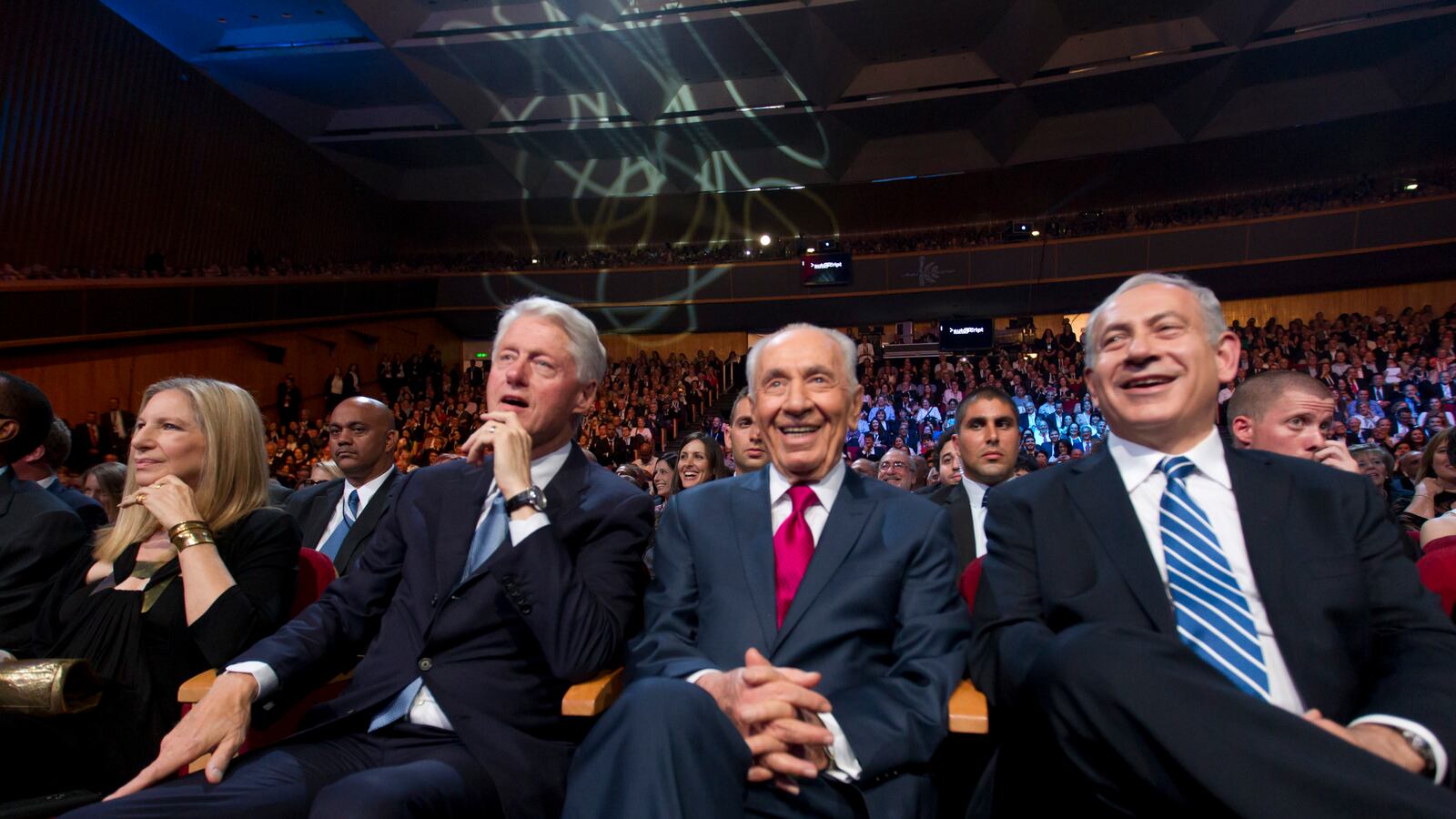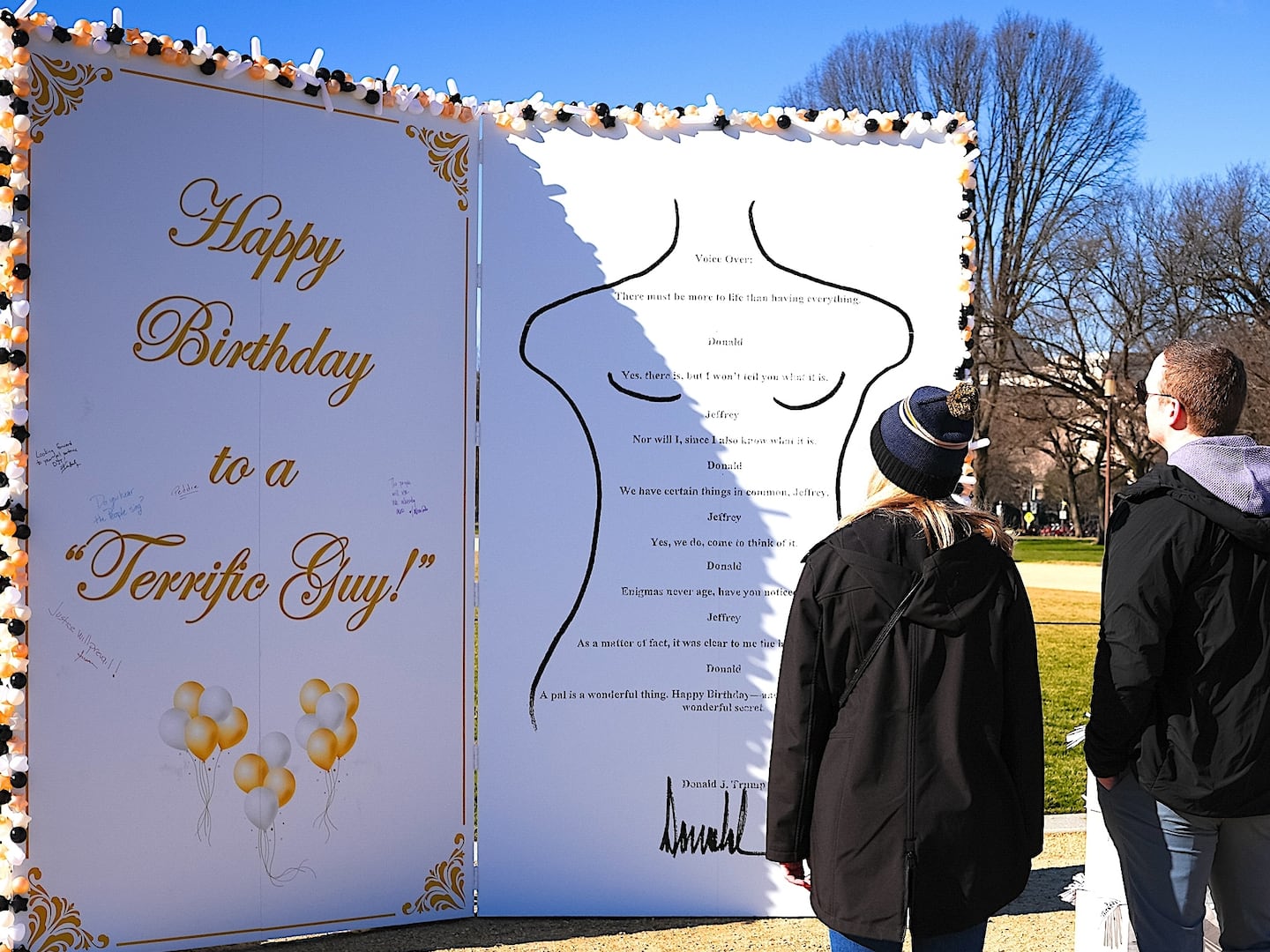The Israeli President's Conference, hosted by Shimon Peres—this year, in honor of his 90th birthday—is a Jewish macher's paradise. It's where you rub shoulders with the big boys and enjoy highbrow ambiance. A few minutes ago, Robert DeNiro walked by me, entourage in tow. Earlier this morning, I watched Tony Blair and Rahm Emmanuel speak on a panel with Shimon Peres, and Bill Clinton tear up as he watched a tribute video dedicated to his work in the Middle East just before he was handed the President's Award, one of the main events here.
This has been the story of the conference whose theme was "Tomorrow"—a half million dollars to Clinton's Foundation for a couple of emotional speeches and a statement ("you are the world's social Einstein") Barbra Streisand singing "Avinu Malkeinu", and an "intimate photo essay" with Shimon Peres. The New York Times quoted Tony Blair as saying, "We in Britain have our queen, and you have your Shimon Peres." And just as the Queen's Jubilee embodies, in some ways, the rarified essence of what the British Empire stands (or stood) for—a glorious and regal history, an intellectually rigorous tradition—the President's Conference shows an imagined ideal Israel hopes to represent: an immaculate, hi-tech, cutting-edge, air conditioned hub where everyone pays for lunch.

And it is truly amazing. I managed, in the span of an hour, to interview two giants of the American Jewish conversation on Israel (although had I wanted to interview any number of Nobel Prize laureates, artists, or past heads of CEOs of tech companies, I probably could have done that, too). I interviewed the Anti-Defamation League’s Abe Foxman, who told me that he's been to every President's Conference, and that this one was the most political. His main message was about the conference's lack of Palestinian voices: "I think it’s wonderful that Tony Blair and Rahm Emmanuel want to be machatonim ("in laws") to peace…but you can't just go with the groom [Israel], you need the bride [the Palestinians]… I get the sense that we're talking to ourselves"—which I took as a fair point. And a few minutes later I spoke with the Jewish Center for Public Affairs's Dore Gold. Our conversation spanned Peter Beinart's The Crisis of Zionism, the U.N.'s failure in Rwanda (Clinton had referenced the issue in his speech, likely because Rwandan President Paul Kagame had been sitting in the front row) and what Gold's "Defensible Borders" meant for a contiguous Palestinian state. I've never done an interview where access was so easily granted.
The speakers, their speeches, the machers, and the mingling made a serious impression on the young people at the conference. I spoke to a number of ambitious Ivy League college students who are in Israel on summer internships through a program called Birthright "EXCEL." They told me (none agreed to be quoted by name) how the "great speakers" and "great speeches" made them feel like they were "learning a lot" from an "amazing number of diverse and incredibly accomplished and intelligent speeches." In short: they were awed.
The slightly older, entrepreneurial generation—those who had already been through this before—were more skeptical. Sam Chester, an American from Minneapolis who immigrated to Israel in 2009, came to Peres's 86th birthday party four years ago. He put it this way:
This is one of those conferences where the real action happens in the hallway—and they've overloaded with big name speakers, but no one can go from panel to panel from morning to night. I wonder to what extent they do this on purpose… I went to this conference when he was turning 86, and there's a certain limit. This is a little overboard… How much does this conference want to be about celebrating a man and how much does it want to be about the broader Israel innovations looking to the future?
It's not that the conference is devoid of substance. It's not. In fact, Sam described the two-and-a-half-day event as a combination of global development and innovation conference (like a "mini-Davos") and a Jewish World get-together (akin to the General Assembly). And it did those things well. It was light on Middle East issues, he said, which is strange because that's what Peres is known for. He established the Peres Center for Peace. He wrote the book, The New Middle East. Yet there was only one panel on "Israel and a Changing Middle East" and close to zero Arab names on the lineup. Sure, politics don't have to consume Israel, but it might have been wise to ease up on the global tomorrow and actually focus on today—here, in the Middle East.






